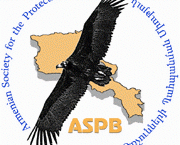
First Nature Visitor Center of South Caucasus in Armenia
In the northern part of Armenia, not far from the border with Georgia, the Dsegh Important Birds and Biodiversity Area (IBA) spreads its boundaries and covers an astonishing territory of 18.500 ha with a fantastic array of biodiversity and nature sites.
This IBA is one of the most biologically diverse regions of the South Caucasus. It stretches from River Debed south towards the foothills of the Halab mountain range and encompasses the land between the rivers Pambak and Marts. It provides diverse habitats, from mountain steppes with prominent rocky outcrops to dense forests with closed canopies, and subalpine and alpine meadows.
Over 150 species of birds have been recorded in the IBA, including magnificent birds of prey such as Lammergeyer (Gypaetus barbatus), Griffon Vulture (Gyps fulvus), Egyptian Vulture (Neophron percnopterus), Lesser Spotted Eagle (Aquila pomarina), Levant Sparrowhawk (Accipiter brevipes), and Peregrine Falcon (Falco peregrinus).
European Roller (Coracias garullus), Semi-collared Flycatcher (Ficedula semitorquata), Corncrake (Crex crex), Caspian Snowcock (Tetraogallus caspius) and Caucasian Grouse (Lyrurus mlokosiewiczi) inhabit the upper treeline of the forest with dense rhododendron thickets.
To bridge the gap between these wildlife treasures and nature lovers, the Armenian Society for the Protection of Birds (ASPB, BirdLife in Armenia) is developing ecotourism in rural areas and has established a Nature Visitor Centre in the Dsegh IBA.
After five years of extended and intense works, ASPB opened the Dsegh Nature Visitor Centre to the public on 12 November, 2015. The centre was established with financial support from SVS (BirdLife in Switzerland), the UNDP's GEF Small Grants Program in Armenia, the Rhône-Alpes Regional Council in France and ASPB, as well as in close partnership with Biotope, a French consultancy.
The centre includes a meeting and cinema hall, and a space with state-of-the-art exhibits on Dsegh’s wildlife. The centre also provides tourists with detailed and comprehensive information about the region and local sites (including bed and breakfasts where they can stay) as well as annual events, all of which will enhance the visitor's understanding of the unique environment of Dsegh.
For the more outdoor-inclined, the centre incorporates tours and two hiking nature trails that people can hike themselves or explore with the help of guides. “In designing and installing our trails, ASPB worked hard to have the lowest level of impact on the land possible while providing access to these special places,” said Luba Balyan, co-founder of ASPB. “We look at the forest as our home, as someplace that we want to protect and revere.”
The purpose of the centre was to have local communities provide services and activities as ecotourism in the Lori region where Dsegh is located. This in turn supports and helps to improve their socio-economic status, as it provides numerous services to the tourists. In a virtuous cycle, the latter motivates these rural communities to play an active role in conserving natural resources and offering ways to solve problems by creating a balance between nature and human development.
ASPB believes that the Nature Visitor Centre in Dsegh will inspire the establishment of other information eco-centers in the country and South Caucasus region. ASPB hopes this innovative network will support not only the protection of nature but also the livelihood of all local communities across the region and will bring Armenia one step closer to nature.
